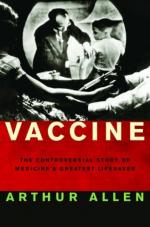|
This section contains 2,899 words (approx. 10 pages at 300 words per page) |

|
A vaccine is a medical preparation given to provide immunity from a disease. Vaccines use a variety of different substances ranging from dead microorganisms to genetically engineered antigens to defend the body against potentially harmful microorganisms. Effective vaccines change the immune system by promoting the development of antibodies that can quickly and effectively attack a disease causing microorganism when it enters the body, preventing disease development.
The development of vaccines against diseases ranging from polio and smallpox to tetanus and measles is considered among one of the great accomplishments of medical science. Contemporary researchers are continually attempting to develop new vaccinations against such diseases as Acquired Immune Deficiency Syndrome (AIDS), cancer, influenza, and other diseases.
Physicians have long observed that individuals who were exposed to an infectious disease and survived were somehow protected against that disease in the future. Prior to the invention of vaccines, however, infectious diseases...
|
This section contains 2,899 words (approx. 10 pages at 300 words per page) |

|


